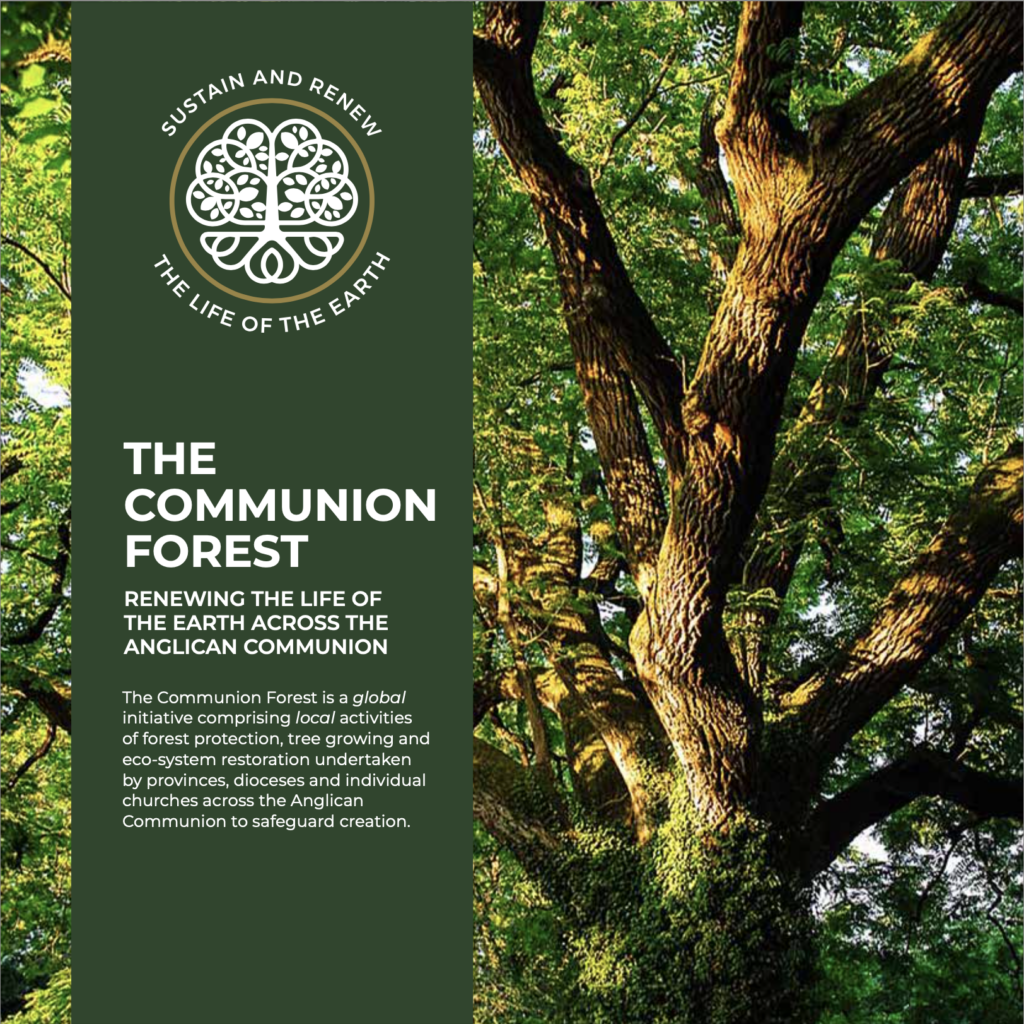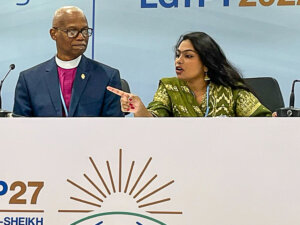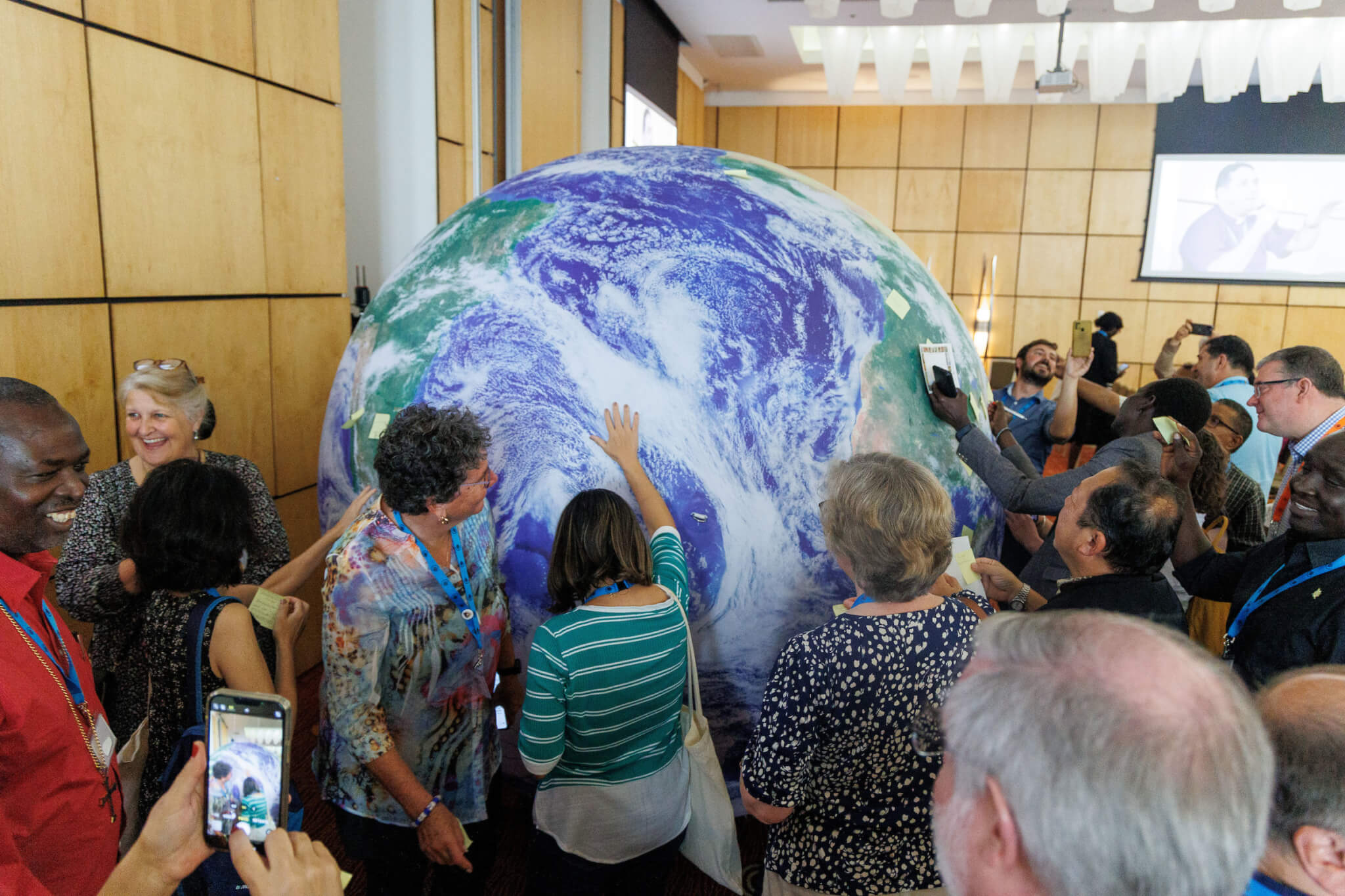Once every three years, there is a meeting of the Anglican Consultative Council (ACC), a gathering to which representatives from each of the 42 provinces (member churches) of the Anglican Communion are invited. During their time together, members pray, worship, study the Bible and discuss matters of mutual concern. The ACC is a consultative body, which can pass resolutions* and make statements of support on different issues.
The 18th ACC took place in Accra, Ghana from 12 to 19 February 2023, with an agenda focused on the Anglican Communion’s Five Marks of Mission. The morning of Friday 17th February was given over to the Fifth Mark of Mission: Strive to safeguard the integrity of creation and sustain and renew the life of the earth.
Focus on the environment
The Bible study, on Mark 4.1-2, 24-36, was led by Bishop Graham Usher, the Church of England’s lead bishop on the environment (who describes himself as “born at 325 ppm atmospheric carbon, now at 412”). The session included testimony from the Rt Revd Benedict Loe, Bishop of the Diocese of Guadalcanal, about the devastating impacts of climate change in the Solomon Islands, where rising sea levels, soil salination and extreme weather are having severe consequences.

Photo: Anglican Alliance/Elizabeth Perry
In the following plenary session, members shared with one another the most pressing environmental challenges in their own contexts. They were invited to write these on sticky notes and place them on a giant inflatable globe, creating a moving picture of how countries across the Anglican Communion are being impacted by the triple environmental crises of climate change, biodiversity loss and pollution. Examples included “Loss of mangroves and marine life due to inconsiderate development and climate change” (West Indies); “destruction of the ecosystem by war and uncontrolled exploration of minerals” (DRC); and “deforestation” (South East Asia).
The Anglican Communion Environmental Network

Rachel Mash, Secretary of ACEN. Photo: Neil Turner for ACO.
Revd Dr Rachel Mash, the secretary of the Anglican Communion Environmental Network (ACEN), spoke about some of the climate feedback loops and tipping points now being reached, but also about the unstoppable movement for climate action. You can watch her presentation here. Quoting Christian climate scientist Dr Katharine Hayhoe, she said:
“Here is where the turning point must occur. Will we allow fear to paralyze us or use it to galvanize us into action. Only one path leads to hope, the other leads us into despair. It is only our actions that offer the chance of a better future.
“The giant boulder of climate action isn’t sitting at the bottom of an impossibly steep hill with only a few hands trying to push it up, but rather it is already at the top and rolling down the hill with millions of hands pushing it in the right direction, that gives us hope. It isn’t going fast enough yet; but for each new hand that joins, it will go a little faster. Every action matters… Every choice matters.”
The Communion Forest
 Next, Dr Elizabeth Perry, the Anglican Alliance’s Advocacy and Communication Manager, presented on the Communion Forest, a vision for the Anglican Communion to join together in protecting and restoring forests and other habitats throughout the world. As previously reported, the Communion Forest was launched during the 2022 Lambeth Conference, as one of the conference’s legacies and a shared expression of the Communion’s commitment to the Anglican Fifth Mark of Mission.
Next, Dr Elizabeth Perry, the Anglican Alliance’s Advocacy and Communication Manager, presented on the Communion Forest, a vision for the Anglican Communion to join together in protecting and restoring forests and other habitats throughout the world. As previously reported, the Communion Forest was launched during the 2022 Lambeth Conference, as one of the conference’s legacies and a shared expression of the Communion’s commitment to the Anglican Fifth Mark of Mission.
The ACC provided an opportunity to introduce the initiative to another of the Anglican Communion’s constituencies and to encourage ACC members to promote the Communion Forest in their provinces. Members were also asked to share with the Communion Forest team information about the existing and new tree growing and ecosystem restoration and protection activities their provinces are undertaking, in order that they can be celebrated and learnt from by others across the Anglican Communion.
Anglican Communion Office at the United Nations (ACOUN) – climate advocacy

Archbishop Julio with fellow ACC delegate Amal Sarah at COP27.
Addressing the ACC via a pre-recorded video (English transcript here), Archbishop Julio Murray, the Anglican Communion’s lead archbishop on the environment, spoke about the growing advocacy work the Anglican Communion is engaged in at the United Nations climate change negotiations. He described how the Anglican Communion’s delegation to COP27, along with other faith communities, advocated on the issue of Loss and Damage due to climate change and how progress was made on the issue in Sharm El Sheikh with the establishment of a Loss and Damage fund. “But”, he also stressed, “we must not forget the call to stop the use of fossil fuel and replace it with other clean energy sources” and emphasised the need for religious leaders to talk to the owners of large CO2 emitting companies in their contexts.
Archbishop Julio also spoke of “the importance of recognising the voices of the Indigenous people in their call for a change in attitude… from [humans] being the greatest extractors of products from Mother Earth to once again being the greatest caretakers – stewards of creation” – and called for the intentional maximisation of Indigenous and youth voices.
Anglican Indigenous Network

Bishop Kito. Photo: Neil Turner for ACO.
Bishop Tekitohi Pikaahu, Chair of the Anglican Communion Indigenous Network (AIN) spoke about environmental racism and its impacts on Indigenous communities. He highlighted one of the key messages from the 2022 Intergovernmental Panel on Climate Change report, which recognises the link between colonialism and climate vulnerability:
“Vulnerability of ecosystems and people to climate change differs substantially among and within regions, driven by patterns of intersecting socioeconomic development, unsustainable ocean and land use, inequity, marginalization, historical and ongoing patterns of inequity such as colonialism, and governance.”
Bishop Kito also stressed the need to heed the “very clear messages coming from Indigenous voices”, (for example, in the Prophetic Indigenous Voices on the Planetary Crisis videos) including that: we are all part of Creation; all life is sacred and connected; and we have a kaitiaki (guardianship) responsibility and a divine call to love our neighbour.

Isaac Beach performing the haka. Photo: Neil Turner for ACO.
At the end of Bishop Kito’s address, there was an unexpected intervention from the floor, when ACC member Revd Canon Isaac Beech from The Anglican Church in Aotearoa, New Zealand and Polynesia spontaneously broke into a haka, which included lament for how capitalism has no regard for the wellbeing of the environment or the people that live within it and depend on it.
Commissioning of new Green Anglicans
During the morning, the Archbishop of Canterbury Justin Welby commissioned four new Green Anglicans from among the young people from Ghana who were serving as stewards during the ACC. Praying for them, he said, “Let them be wise in how they speak prophetically, gracious in helping the hard of hearing to understand and provocative in blowing open the doors that are locked against change”.

Praying for the new Green Anglicans. Photo: Neil Turner for ACO
Resolutions on the environment
The following day, the ACC passed three resolutions* specifically about the environment and climate change:
5 (b): Moratorium on new Fossil fuel developments
The Anglican Consultative Council:
- notes that the Fossil Fuel Non-Proliferation Treaty (to stop the increase of fossil fuel projects) offers a practical way to live out the fifth Mark of Mission in response to the climate crisis.
- supports the Treaty and requests the Secretary General to sign the Treaty on behalf of ACC; and
- encourages primates and bishops to sign on behalf of the Churches and dioceses of the Communion and advocate their governments to halt new gas and oil exploration.
5 (e): The Communion Forest
The Anglican Consultative Council:
- recognises that the integrity of creation is under threat and at risk of collapse; and there is urgent need to reduce our carbon footprint and protect biodiversity;
- affirms the potential of the Communion Forest initiative launched as a legacy of the 2022 Lambeth Conference;
- invites Churches of the Communion to join in this initiative to be ambitious in using their God-given assets; to weave creation care into the spiritual and liturgical life of the Church; and
- commends the collaboration of the Anglican Alliance and Anglican Communion Environmental Network, and encourages Churches of the Communion to share with them information about their existing and new activities.
5 (g): Responding to the loss and damage caused by climate change
The Anglican Consultative Council:
- believes that more must be done by those responsible for climate change to support the resilience and recovery of those most vulnerable to its impacts, especially poor and marginalised communities, women, young and elderly people, and indigenous peoples;
- commends the United Nations’ Climate Summit COP27 in November 2022 for establishing a Loss and Damage Fund facility, through which the wealthier and greater historic contributors to climate change will financially support developing countries to recover from climate disasters;
- encourages the Churches of the Communion to use the Anglican Communion UNFCCC COP26 Policy Paper and the COP27 update to advocate for climate justice; and
- requests the Anglican Alliance and the Anglican Communion Environmental Network to research and propose potential models and means for this work and to report to the ACC Standing Committee in 2024.
Other environmental initiatives during the ACC

Planting a tree after the ACC closing service. Photo: Neil Turner for ACC.
During the ACC, the new Eco-theology resource “Renewing the Life of the Earth” was launched. This is a set of video presentations on ecological theology and practice. The videos introduce some key issues and questions and include lists of further online resources. They present a range of voices from across the Anglican Communion – from all kinds of people and from all kinds of backgrounds, in a number of languages. A guide book to all the videos is available here. The videos themselves are available on YouTube, here.
Tree planting. At different times during the ACC, Archbishop of Canterbury Justin Welby alongside Archbishop Cyril Kobina Ben-Smith, Primate of the Church of the Province of West Africa, planted trees, including at Bishopcourt following a visit to Cape Coast Castle and at St George’s Anglican Garrison Church after the closing service of the ACC.
The Anglican Alliance at ACC
The environment plenary session, incorporating the ACEN, ACOUN, Communion Forest and AIN presentations, was curated by the Anglican Alliance, who also helped draft resolutions 5 (e) and 5 (g).
The Anglican Alliance also presented about the work of the Alliance on Tuesday 14th February on the day focused on the Third Mark of Mission, responding to human need by loving service. In this session, the Alliance shared in particular on its Covid response, on its Reimagining our World and SDG Contextual Bible Studies, and its disaster resilience and response areas of work. A story will follow on this.
*Resolutions cannot be imposed on the provinces of the Anglican Communion (because member churches are autonomous) but rather encourage and urge members to act together (reflecting the independent-yet-interdependent nature of the Communion).
The ACC is one of the four Instruments of Communion, or Unity, in the Anglican Communion and the only one whose membership includes laity, priests and deacons (as well as bishops and archbishops). The other Instruments of Communion are the Lambeth Conference, the Primates’ Meeting and the Archbishop of Canterbury.

